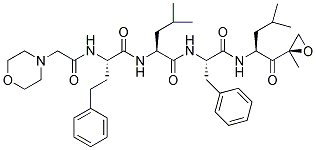All AbMole products are for research use only, cannot be used for human consumption.

Carfilzomib (PR-171) is a tetrapeptide epoxyketone and a selective proteasome inhibitor. Carfilzomib irreversibly binds to and inhibits the chymotrypsin-like activity of the 20S proteasome, an enzyme that degrades unwanted cellular proteins. Carfilzomib (PR-171) induced a dose- and time-dependent inhibition of proliferation, ultimately leading to apoptosis. Carfilzomib and its orally bioavailable analog oprozomib, effectively decreased MM cell viability following continual or transient treatment mimicking in vivo pharmacokinetics. In clinical trials, carfilzomib (PR-171) has exhibited potent anti-myeloma efficacy and decreased side effects compared with bortezomib. At clinically relevant concentrations, carfilzomib directly inhibited OC formation and bone resorption in vitro, while enhancing osteogenic differentiation and matrix mineralization. Carfilzomib is currently in a phase III confirmatory clinical trial, known as the ASPIRE trial, comparing carfilzomib, lenalidomide and dexamethasone versus lenalidomide and dexamethasone in patients with relapsed multiple myeloma.Carfilzomib showed stronger inhibitory activity and longer inhibition time against bortezomib resistant cells, and showed higher selectivity against proteasome. Its IC50 against 20S proteasome β5 was 3.4nmol/L.
*The compound is unstable in solutions, freshly prepared is recommended.
| Molecular Weight | 719.91 |
| Formula | C40H57N5O7 |
| CAS Number | 868540-17-4 |
| Solubility (25°C) | DMSO 65 mg/mL |
| Storage |
Powder -20°C 3 years ; 4°C 2 years In solvent -80°C 6 months ; -20°C 1 month |
| Related Proteasome Products |
|---|
| Proteasome inhibitor IX
Proteasome inhibitor IX (PS-IX; AM114) is a Chalcone derivative and a chymotrypsin-like activity of the 20S proteasome inhibitor with an IC50 value of ~1 μM. |
| NIC-0102
NIC-0102 is an orally potent proteasome inhibitor (pIC50=7.55) that specifically inhibits NLRP3 inflammasome activation.NIC-0102 showed potent anti-inflammatory effects in vivo in a DSS-induced ulcerative colitis model. In addition, NIC-0102 inhibited the production of pro-IL-1β. |
| Ac-WLA-AMC
Ac-WLA-AMC is a specific 20S constitutive proteasome β5 fluorogenic substrate. |
| Ac-Nle-Pro-Nle-Asp-AMC
Ac-Nle-Pro-Nle-Asp-AMC is a specific substrate for 26S proteasome. |
| PR-39
PR-39, a natural proline- and arginine-rich antibacterial peptide, is a noncompetitive, reversible and allosteric proteasome inhibitor. |
All AbMole products are for research use only, cannot be used for human consumption or veterinary use. We do not provide products or services to individuals. Please comply with the intended use and do not use AbMole products for any other purpose.


Products are for research use only. Not for human use. We do not sell to patients.
© Copyright 2010-2024 AbMole BioScience. All Rights Reserved.
